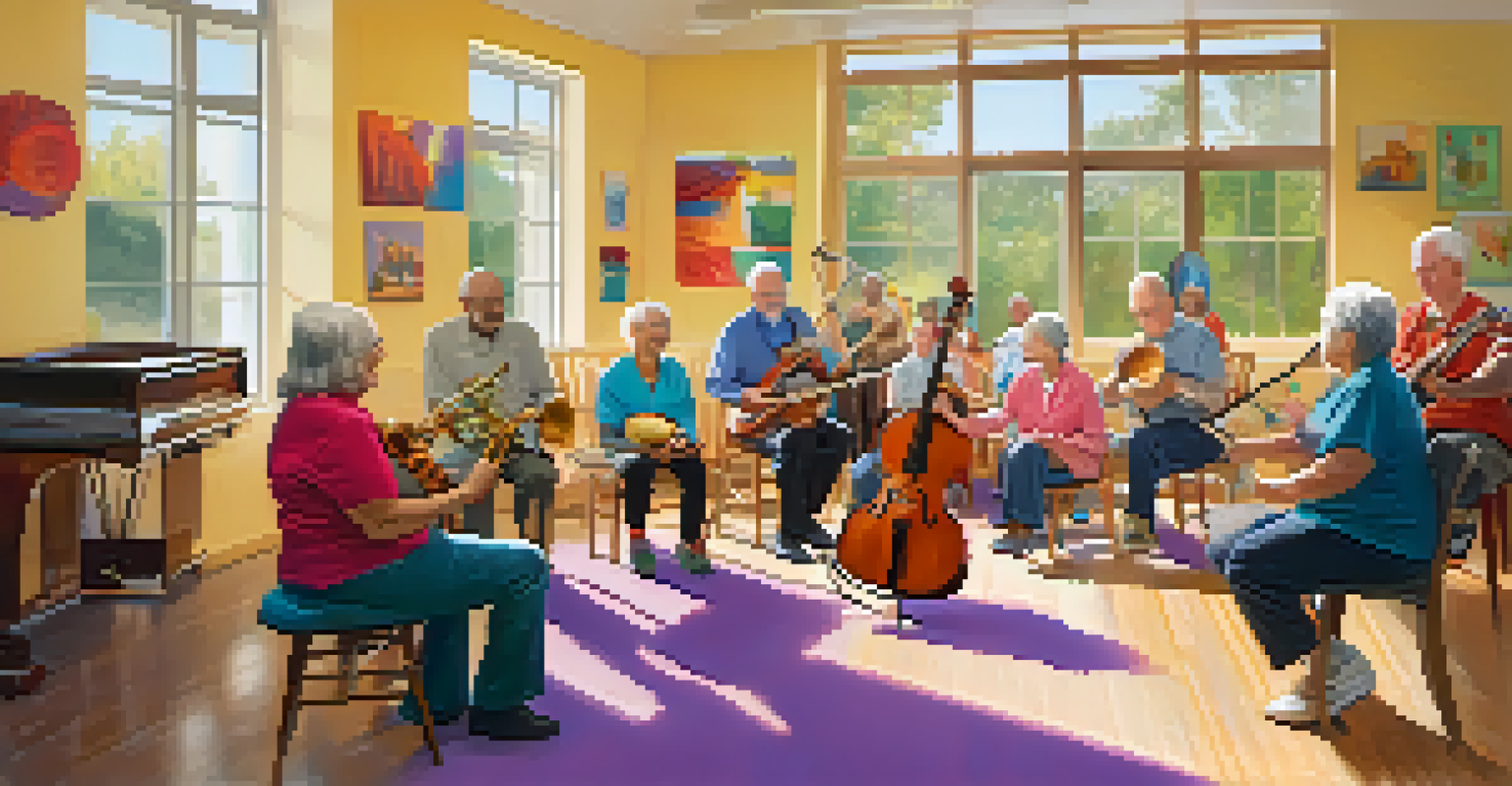Neurological Benefits of Music for Aging and Cognitive Decline

Understanding Cognitive Decline in Aging Individuals
As we age, many of us experience cognitive decline, which can affect memory, attention, and problem-solving skills. This decline can feel like a fog settling in, making it harder to recall names or keep track of daily tasks. Understanding this natural process helps us find ways to combat its effects and maintain our mental faculties. One promising avenue is the use of music, which offers a unique approach to stimulate the brain.
Music can change the world because it can change people.
Cognitive decline isn't just about forgetting; it can also impact our emotional well-being. The loss of cognitive abilities can lead to feelings of frustration or isolation, as individuals may struggle to keep up with social interactions. Music, with its universal appeal, provides a comforting and enjoyable way to navigate these challenges and engage with others. It's like having a familiar friend by your side, making every moment a little brighter.
Research shows that the brain remains adaptable, even in older age, a phenomenon known as neuroplasticity. This means that engaging with music can help forge new neural connections, aiding in memory retention and improving cognitive function. In a way, listening to music can be like a workout for the brain, helping it stay fit and agile as we age.
The Science Behind Music and the Brain
When we listen to music, multiple areas of the brain light up, revealing the complex relationship between music and cognition. From the auditory cortex to the emotional centers, each note can evoke memories and feelings, effectively creating a multidimensional experience. This cross-talk between different brain regions can help to enhance cognitive functions in aging individuals, making music a powerful tool for mental engagement.

Studies have shown that music can improve memory recall, especially for individuals with Alzheimer's disease and other forms of dementia. For example, familiar tunes can trigger memories that might otherwise remain buried, much like a key unlocking a long-forgotten treasure chest. These moments of clarity can bring joy not only to those experiencing cognitive decline but also to their caregivers and loved ones who witness these connections.
Music Enhances Cognitive Function
Engaging with music can stimulate the brain, helping to improve memory retention and cognitive abilities in aging individuals.
Moreover, music therapy has gained popularity as a structured intervention for cognitive decline. Therapists often use personalized playlists or engage patients in musical activities to stimulate their cognitive abilities. It’s an innovative approach that highlights music’s potential to serve as a bridge between the present and cherished memories, creating a sense of continuity in the aging process.
Emotional Benefits of Music for Seniors
Beyond cognitive enhancement, music has profound emotional benefits for aging individuals. Listening to or playing music can promote feelings of happiness and nostalgia, helping to combat loneliness and depression. It’s as if music acts as a balm for the soul, providing comfort and a sense of belonging during challenging times.
The music is a universal language and can bring people together regardless of their age or cognitive abilities.
For many seniors, music can evoke powerful memories that transport them back to significant moments in their lives. Whether it’s a beloved song from their youth or a lullaby sung by a grandparent, these musical memories can spark joy and foster connections with family members. In essence, music becomes a shared language that transcends the barriers of age and cognitive decline, allowing for meaningful interactions.
Engaging with music can also stimulate the release of dopamine, a neurotransmitter associated with pleasure and reward. This chemical boost can lead to improved mood and motivation, encouraging seniors to participate in social activities or pursue hobbies they enjoy. In this way, music not only uplifts spirits but also promotes a more engaged and active lifestyle.
Music Therapy: A Structured Approach to Cognitive Care
Music therapy is a clinical and evidence-based practice that utilizes music to address various therapeutic goals. Certified music therapists design sessions tailored to the individual needs of seniors, focusing on enhancing cognitive function through interactive musical activities. This structured approach ensures that music is not just a passive experience; it actively engages the mind and body.
During therapy sessions, seniors might participate in singing, playing instruments, or even composing music. These activities can help improve memory and attention, as well as foster social interaction among participants. Imagine a group of seniors coming together to create a song; it not only enhances cognitive abilities but also builds friendships and a sense of community.
Emotional Benefits of Music
Music promotes feelings of happiness and nostalgia, combating loneliness and enhancing emotional well-being among seniors.
Additionally, music therapy can be adapted for individuals with different levels of cognitive decline. For those who may struggle with verbal communication, music offers an alternative means of expression. This adaptability makes music therapy a versatile tool in promoting cognitive health and emotional well-being among aging individuals.
Creating a Musical Environment at Home
One of the simplest ways to harness music's benefits is by creating a musical environment at home. This can be as easy as playing favorite tunes during meals, family gatherings, or quiet moments. Having music in the background can stimulate conversations and evoke cherished memories, making everyday activities feel more special.
Consider curating personalized playlists that resonate with your loved ones. Whether it’s classic hits, jazz, or soothing melodies, having music that reflects their preferences can enhance their mood and cognitive engagement. Just like a warm blanket on a chilly day, familiar music can provide comfort and joy.
Incorporating music into daily routines can also foster a sense of structure and purpose. For instance, setting specific times for music-related activities, such as sing-alongs or dance sessions, can encourage participation and create a fun atmosphere. These small changes can significantly impact overall well-being, proving that music truly is a universal remedy.
The Role of Group Music Activities
Participating in group music activities can amplify the cognitive and emotional benefits of music. Whether it's a choir, drumming circle, or community band, engaging with others through music fosters social connections and combats feelings of isolation. The shared experience of making music can create bonds that enrich lives and enhance mental health.
Group activities also encourage collaboration and communication, essential skills that can sometimes decline with age. Working together to create harmonies or rhythms can stimulate cognitive processes and promote a sense of achievement. This teamwork can be invigorating, reminding participants that they are still capable of contributing and connecting with others.
Music Therapy's Structured Approach
Music therapy provides a personalized and interactive way to address cognitive decline, fostering social connections and cognitive engagement.
Moreover, these group settings often provide a supportive environment where individuals feel safe to express themselves. The joy of performing or simply enjoying music together can instill a sense of purpose and belonging. In this way, music becomes not just an individual experience, but a shared journey that uplifts the spirit.
Looking Ahead: The Future of Music and Aging
As research continues to unveil the neurological benefits of music, the future looks promising for its role in aging and cognitive health. We’re seeing more healthcare facilities and communities embracing music therapy and group music activities as essential components of care. This shift signifies a growing recognition of music as a powerful tool for enhancing quality of life in older adults.
Innovations in technology are also paving the way for more accessible music experiences. From apps that facilitate music therapy to virtual concerts, the possibilities for engaging with music are expanding. This means that even those who may be homebound can still enjoy the benefits of music, connecting with others and enriching their lives.

In conclusion, the neurological benefits of music for aging and cognitive decline are profound. By embracing music as a staple in our lives, we can foster healthier, happier, and more connected communities for seniors. As we continue to explore this harmonious relationship, there’s no doubt that music will remain a vital part of the aging experience.